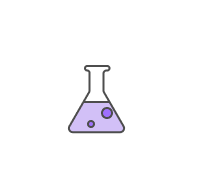A change that results in the new formation of a substance
Any chemical that can accept a hydrogen ion, taste bitter, feel...
A positively charged particle that is located in the nucleus of an...
Anything that takes up space and has mass
A measurement of the amount of space an object takes up
A push or a pull
A fundamental force that pulls everything towards the center of a...
The smallest particle of matter
Any chemical that can give a hydrogen ion, taste sour, corrode metal,...
A study of the materials that make up the universe(matter) and the...
A state of matter where the atoms are arranged in tight, regular...
A state of matter where the atoms can slide past each other, have more...
A negatively charged particle that orbits the nucleus of an atom
A change that alters the appearance of a substance, but does not...
A substance made up of two or more elements
The smallest particle of a substance made one or two more atoms
A chemical reaction where heat is released, feeling hot
A chemical reaction where heat is absorbed, feeling cold
Created by Demetri Mendelev in 1896, it is a table of all the known...
A property that tells us the temperature at which a substance melts,...
The center of an atom, containing both the protons and neutrons
A measurement of the amount of matter in an object
The energy that is stored in an object because of its position, and is...
A property that tells us the temperature at which a substance boils,...
The energy an object has because it is moving
A state of matter where the atoms are moving very fast, have large...
A particle with no charge (neutral) that is located in the nucleus of...
One of the three groups of elements that share properties such as high...
Two or more substances mixed together, but do not chemically combine
A measurement of how acidic or basic a solution isRanging 0-14, where...
The lowest possible temperature in the universe, where all molecular...
Also called semi-metals, one of the three groups of elements that...
A measurement of the energy of motion(kinetic energy) of particles in...
Any of the more than 100 known pure substances that cannot be...
One of the three groups of elements that share the same properties...
The transfer of thermal energy from one object to another
Also called noble-gases, the group of elements on the far right of the...
Characteristics of a substance that never change, and can be used to...
The electrons in the outer most shell of an atom, that are involved in...
A group of electrons that orbit the nucleus of an atom

















